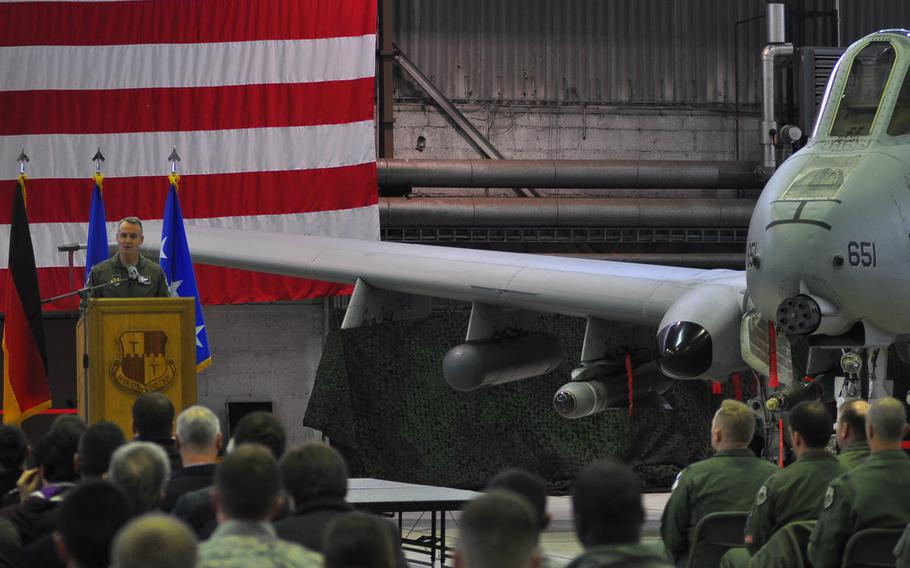
Standing next to an A-10 Thunderbolt II, Lt. Gen. Darryl Roberson, 3rd Air Force commander, speaks during a ceremony on Feb. 18, 2015, at Spangdahlem Air Base, Germany. Roberson welcomed members from the 354th Expeditionary Fighter Squadron, who are deployed to Spangdahlem, along with 12 A-10s, from Davis-Monthan Air Force Base, Ariz. (Jennifer Svan/Stars and Stripes)
SPANGDAHLEM AIR BASE, Germany — As fighting continues in Ukraine despite new attempts at a cease-fire, U.S. Air Force leaders in Europe on Wednesday welcomed back a Cold War relic.
Close-air support A-10 “Warthogs” — designed in the 1970s to knock out Soviet tanks — are back in Germany.
Over the last week, about 300 personnel and 12 A-10 Thunderbolt II aircraft arrived from Davis-Monthan Air Force Base, Ariz., for a six-month deployment intended to bolster security in a region shaken by the political crisis in eastern Europe.
“Get ready for some travel,” Lt. Gen. Darryl Roberson, 3rd Air Force commander, told airmen from the 354th Expeditionary Fighter Squadron, who gathered in a hangar along with local civic leaders for a brief ceremony to showcase the first so-called theater security package to deploy to Europe.
“This theater security package is a long-range strategic capability to allow the Air Force greater flexibility against evolving threats,” Roberson said.
Temporarily bringing the A-10 squadron to Spangdahlem “will allow us to focus on the challenges throughout Europe and potentially in Africa,” he said.
The jets will deploy from Spangdahlem and work with NATO partners, “especially along the border of Russia, Lithuania, Estonia, Romania, Bulgaria,” Roberson said. “They will train together and learn how to interoperate together, so that if something happens, we’re ready to fight together.”
The A-10s will participate in routine exercises already scheduled as part of Operation Atlantic Resolve, the military’s response to the Ukraine crisis.
The training will focus on the close-air support specialty, Roberson said. Originally designed to fly low and slow to provide protection for ground troops in Europe if the Russians ever invaded Germany, A-10s were once a fixture on the Continent.
At one time, there were six squadrons of A-10s in Europe with more than 140 aircraft.
Since communism’s collapse, the jets have stayed busy, providing close-air support for ground troops during the wars in Iraq and Afghanistan. More recently, the Warthogs have been used to strike Islamic State targets in the Middle East.
The last A-10s to be assigned to Europe left Spangdahlem just less than two years ago.
Despite the recent flare-up of tensions between Ukraine and Russia, in hindsight it would not have made sense for the Air Force to keep the planes here, Roberson told reporters.
“Actually, the way we’re doing it now is a much more agile and responsive and cheaper way to present forces as required,” he said.
Getting the call to deploy to Germany wasn’t expected, but it’s not really a surprise, either, said Lt. Col. Steve Behmer, the commander of the 354th Expeditionary Fighter Squadron.
“In the Air Force, we expect to be anywhere, any time,” he said.
“I think as long as we have armies in the world, there will be a need for close-air support; the mission will exist,” Behmer said.
Ten of the 12 A-10s from Davis-Monthan were previously assigned to Spangdahlem, U.S. Air Forces in Europe officials said.
Behmer said a few of his personnel, including some pilots, were stationed at Spangdahlem.
“We tried to bring expertise that was here before, so that we could have those guys that have flown here and were familiar with the area, particularly for flying operations,” he said.
Roberson said the A-10 was chosen for the first theater security package to deploy to Europe because it was available at the time for the mission.
The next package will consist of F-15C fighter jets and will “be here in April,” Roberson said. Details about where they’ll be based and from which location they’ll deploy haven’t been determined, USAFE officials said.
“This operation will remain a construct here in Europe as long as it is needed,” Roberson said of rotational forces.